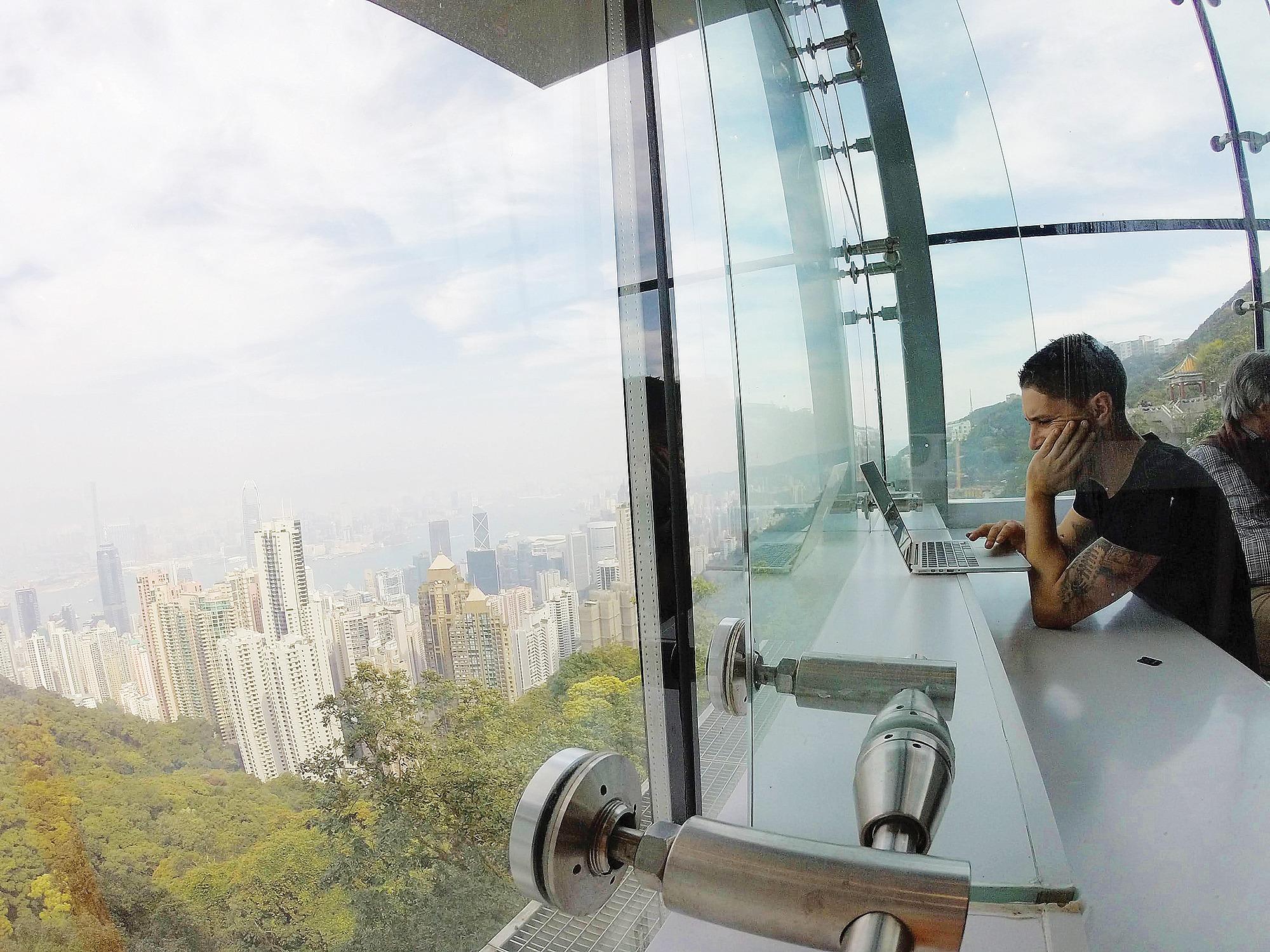Can Hong Kong shape up as a digital nomad hub, giving serious competition to Bali and Chiang Mai? Will Hatton examines how the SAR stacks up against its rivals in the business.
 Digital nomad and blogger Aaron Radcliffe enjoys the sense of community that Hong Kong’s coworking spaces can inspire. (PHOTO PROVIDED TO CHINA DAILY)
Digital nomad and blogger Aaron Radcliffe enjoys the sense of community that Hong Kong’s coworking spaces can inspire. (PHOTO PROVIDED TO CHINA DAILY)
Imagine being able to work from a location where the view just beyond your laptop is more magnificent than any dream-destination screensaver. Imagine creating a life where work, travel, and play blend effortlessly together.
That would be a digital nomad’s dream.
A digital nomad (DN) is someone who either works remotely for others or creates their own online careers or businesses. Today’s hip and mostly young DNs combine work and travel seamlessly. They usually keep a flexible work schedule while earning enough to fund a life of adventure.
Though not in the same league as the universally favored DN destinations such as Chiang Mai and Bali, Hong Kong has many of the attributes required to shape up as a DN hot spot. Its unrivaled internet speed, community-oriented coworking spaces, bustling, cosmopolitan social life, and the abundance of nature just outside its urban areas make for a winning combination. The “work hard, play hard” balance that many DNs seek seems achievable here.
“DNing in Hong Kong is expensive, but totally awesome if you can afford it,” says Aaron Radcliffe, writer of two blogs, Nomads Nation and One Weird Globe. “There are tons of coworking spaces and the startup scene is great.”
One way of cutting costs, Radcliffe suggests, is to find accommodations outside of Hong Kong Island. He lives in Kowloon and relies on the fast and affordable Star Ferry to commute to downtown Hong Kong. At 40 US cents and eight minutes per ride, he said, “sailing to and from Victoria Harbour is a highlight of my day. Kowloon has cheaper accommodations compared with Hong Kong Island and is packed with cafes, restaurants, bars, shops, and MTR stations”.
Like most DNs, Radcliffe doesn’t mind the high costs of renting a desk in a coworking space, especially because of the social life one gets access to in the bargain.
 Hong Kong’s sprawling vistas of scenic beauty, often possible to enjoy from Wi-Fi-enabled cafes, are a big draw for DNs like Radcliffe. (PHOTO PROVIDED TO CHINA DAILY)
Hong Kong’s sprawling vistas of scenic beauty, often possible to enjoy from Wi-Fi-enabled cafes, are a big draw for DNs like Radcliffe. (PHOTO PROVIDED TO CHINA DAILY)
In Hong Kong, for $200 and above a month, it’s possible to get a spacious desk, lightning-fast Wi-Fi speed, and the chance to hang out with fellow DNs. The evenings are often spent attending workshops at networking events or simply socializing. It’s a great way to meet people and belong in a community away from home.
The owner of a content marketing agency and blogger of Pale Ale Travel, Big Body prefers to go by his moniker. He is happy to work from The Hive in Sheung Wan. “It is a healthy mix of remote workers and traditional companies who rent full office spaces,” he says of the coworking space. Having lived in Taiwan, Vietnam, Austria, Slovakia, Hungary, Croatia, Japan, Thailand and the Chinese mainland, he decided that Hong Kong was the place for him, given its “palpable energy” and “extremely low tax rates”. Having lived here in 2012-14, he returned in 2020 for another stint.
DNs are often looking for more than just a place to work. More often than not, they are more interested in opportunities to experience a new landscape.
Hikers and lovers of outdoor activities are spoiled for a choice in Hong Kong. Very few metropolitan cities can match the special administrative region’s 24 national parks and 130 nature trails. And the best part is that the hikes and green expanses are often just a stone’s throw, sometimes a bus ride, away from the urban areas.
“I wake up slightly earlier on Fridays to hike up to the Peak, which looks out over the Hong Kong skyline,” says Big Body. “I grab breakfast at one of the eateries, hike back down, and then start my day slightly later than usual.”
 Having lived in many countries, blogger and content marketing agency-owner, Big Body (in white shirt) settled for Hong Kong because of the city’s “palpable energy”. (PHOTO PROVIDED TO CHINA DAILY)
Having lived in many countries, blogger and content marketing agency-owner, Big Body (in white shirt) settled for Hong Kong because of the city’s “palpable energy”. (PHOTO PROVIDED TO CHINA DAILY)
Hot spot challenge
How does Hong Kong compare to other digital nomad hot spots in Asia?
“Digital nomads thrive in Bali,” says Rose Hodge, writer of the Balipedia blog and a long-term Bali resident. Full of coworking spaces and Wi-Fi-enabled cafes, Bali remains a top global destination for DNs. “There’s a magic about this island, and when you’re here, you can just feel it. Creativity comes alive here,” says Hodge. Also, it’s the location of Indonesia’s first custom-built coworking hostel, Tribal Bali. While Bali seems ideal for those DNs seeking a chilled vibe, Hong Kong’s business-focused ethos has its own following.
Chiang Mai, the “search-engine optimization capital of the world”, has an array of charming temples and lush mountains going for it. One of the early adopters of the DN lifestyle, Chiang Mai’s coworking spaces and DN community stand on a more solid foundation compared with other cities. Chiang Mai’s main attraction, however, is its remarkably low cost of living. It’s possible to live comfortably on $1,500 per month.
The cost of living in Hong Kong, around $2,000 to $5,000 a month, especially when compared to Bali and Chiang Mai, could be a deterrent for DNs on a tight budget. Trying to cut costs at every opportunity could be counterproductive, especially when the goal is to lead a carefree life.
“The biggest struggle has been trying to scale my business,” says Big Body. Because of the high rentals involved, it took longer than usual to set himself up in Hong Kong. And then there was the anxiety over losing some of his valued clients as a result of the delay.
Most DNs in Hong Kong opt to stay in backpacker hostels to keep their costs down. If Hong Kong wants to pitch itself as a DN magnet, it will need to focus on providing affordable housing for them.
Hopefully, the SAR government’s initiative to attract talent from around the world will make more DNs consider Hong Kong. Kenny Shui Chi-wai, vice-president and co-head of research at Our Hong Kong Foundation, says that the government has adopted their recommendations “to lift the requirement for technology firms to employ additional local employees while admitting (overseas) talents” and “expand the scope to cover more technological fields under the Technology Talent Admission Scheme”. Additionally, the Top Talent Pass Scheme, launched in December 2022, allows Hong Kong “to seek top talents with rich work experience and/or good academic qualifications by offering a two-year visa without first having to secure a job offer”.
The stage is set for Hong Kong to grow back into a bustling, cosmopolitan and inclusive city where professionals from diverse backgrounds can thrive, and there’s no reason why DNs should not make up a substantial section of the global talent it hopes to attract.


